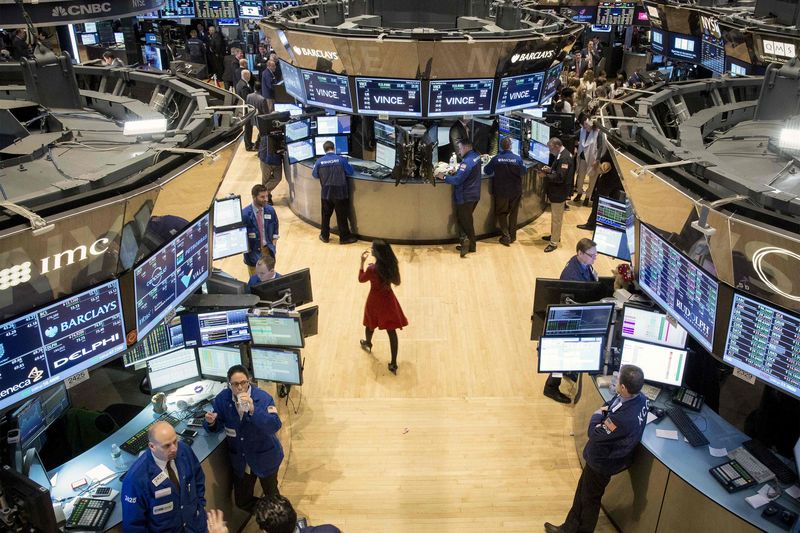By Geoffrey Smith
Investing.com -- OPEC and its allies plot a big cut in oil output in defiance of U.S. President Joe Biden. ADP releases its estimate for private-sector hiring, a day after the Labor Department's Job Openings survey showed a sharp drop in vacancies. U.K. Prime Minister Liz Truss will try to restore some clarity over the direction of her policies. And the aftershocks of Elon Musk's surrender to Twitter reverberate through U.S. stock markets. Here's what you need to know in financial markets on Wednesday, 5th October.
1. OPEC+ set to cut production quotas sharply
The world’s biggest oil exporters are set to agree on a hefty output cut from November at a meeting in Vienna.
Newswire reports suggest that the Organization of Petroleum Exporting Countries and its allies (chiefly Russia) will cut their output quota by as much as 2 million barrels a day in order to shore up falling prices, with some reports also hinting at further unilateral action by Saudi Arabia.
Any cut will be a major frustration for the administration of U.S. President Joe Biden, who has released millions of barrels from the Strategic Petroleum Reserve to bring domestic gasoline prices down before November’s mid-term elections.
Crude oil prices hit a three-week high on Tuesday as details of the members’ negotiating positions leaked out (and as U.S. inventory data surprised to the downside) but they have steadied overnight with U.S. crude trading down 0.1% at $86.41 a barrel, while Brent crude is down 0.1% at $91.73 a barrel.
2. Twitter stock doesn't quite believe the Musk takeover yet
Elon Musk is licking his wounds and Carl Icahn is counting his profits after Musk agreed to go through with his bid for Twitter (NYSE:TWTR) at the original price of $54.20, after trying to walk away from the deal during the summer.
Musk’s change of heart on Tuesday came only days before he was due to be deposed in connection with Twitter’s lawsuit in Delaware. However, the market is still not pricing the takeover as a done deal: Twitter stock fell 0.6% in premarket to $51.76, nearly 5% below Musk’s bid price.
The latest developments set the stage for what promises to be an interesting spectacle of a leveraged buyout carried out with prevailing interest rates at their highest level in over a decade. That will leave the barely-profitable social media company with an interest bill that will make Musk’s valuation even more challenging than it was originally.
3. ADP report to add color to labor market picture
ADP will release its estimate of private-sector hiring in the U.S. in the month through mid-September, a day after the Labor Department announced one of the biggest ever monthly drops in job openings across the country.
The numbers were rocket fuel to a market that is increasingly open to betting on a policy pivot from the Federal Reserve. Comments after the data from Fed Governor Philip Jefferson and San Francisco Fed President Mary Daly poured cold water on those hopes, however, pushing the dollar up and risk assets down overnight.
The dollar gained half a percent overnight, helped by a 50 basis point hike from the Reserve Bank of New Zealand which dented hopes that its colleagues in Australia may have started a trend with their smaller 25 basis point hike on Tuesday. Poland, Romania, and Iceland all have their central bank meetings today.
4. Stocks set to open lower after wild surge; Fed damps pivot hopes
U.S. stock markets are set to give up around one-third of Tuesday’s gains at the open, as participants pause for breath after a wild short-covering rally.
By 06:25 ET (10:25 GMT), Dow Jones futures were down 286 points, or 0.9%, while S&P 500 futures and Nasdaq 100 futures were down by a similar amount.
Stocks likely to be in focus later include, naturally, Twitter and Tesla (NASDAQ:TSLA). The latter traded down 1.2% in premarket amid uncertainty over how much overhang will be created in the stock as Musk pledges shares against the loans he will need to buy the social media company.
5. Truss speech fails to ease pound, gilt concerns
U.K. Prime Minister Liz Truss tried to draw a line under the communications debacle that has been her first month in office, in a - relatively - clear speech to the Conservative Party’s annual conference.
Truss pledged that her government “will always be fiscally responsible” and also backed off previous threats to end the Bank of England’s independence, saying it was right that the central bank should set interest rates free of political interference.
However, she also stuck to her commitment to lower taxes without giving any corresponding detail about how her tax cuts will be funded. The pound lost nearly a cent against the dollar in anticipation of the speech and continued falling as it started. Government bonds didn’t like it either, the benchmark 10-Year yield rose 14 basis points to 4.00%.
